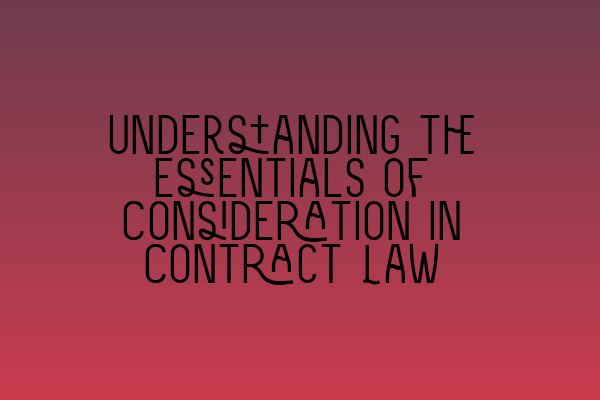Understanding the Essentials of Consideration in Contract Law
In contract law, consideration forms one of the fundamental principles upon which a valid contract is built. It is a crucial element that demonstrates that a contract has been formed between two or more parties. Without consideration, a contract may be deemed void or unenforceable. This blog post aims to provide a comprehensive understanding of consideration in contract law, exploring its definition, significance, and examples. So, let’s dive into the essentials of consideration.
What is Consideration?
Consideration refers to something of value exchanged between the parties involved in a contract. It can take various forms, such as money, goods, services, promises, or even forbearance to act. Consideration acts as the price or inducement for a party to enter into a contract and forms the basis for their obligation to perform under the contract.
Importance of Consideration in Contract Law
Consideration is crucial in contract law for several reasons:
1. Mutual Consent: In order to form a valid contract, both parties must offer some form of consideration. It ensures that there is a mutual agreement between the parties involved.
2. Fairness and Equity: Consideration ensures fairness and equity in contractual relationships. It prevents one party from taking advantage of another by obligating both parties to give and receive something of value.
3. Enforceability: Consideration is a vital element that gives a contract its legal force and effect. Without it, a contract may lack the necessary elements to be enforceable in a court of law.
4. Evidence of Intent: Consideration serves as evidence of the parties’ intent to be bound by the terms of the contract. It demonstrates that the parties have given serious thought to entering into a binding agreement.
Examples of Consideration
To better understand consideration, let’s explore a few examples:
1. Sale of Goods: Alice agrees to sell her car to Bob for $10,000. The consideration in this case is the money that Bob gives to Alice, and the car that Alice transfers to Bob. Both parties have provided something of value, making the contract valid.
2. Services: Sarah promises to paint John’s house, and John agrees to pay her $500 for her services. The consideration here is Sarah’s promise to paint the house and John’s promise to pay her. Both promises form the basis of their contractual obligations.
3. Forbearance: Tom has a valuable collection of baseball cards, and he promises not to sell them to anyone else for a certain period. In return, Mark agrees to pay Tom $1,000 as consideration. Tom’s forbearance to sell the cards and Mark’s payment of $1,000 are the considerations in this contract.
Understanding consideration is vital for any aspiring legal professional preparing for the SQE exams. To enhance your knowledge and improve your exam preparedness, consider exploring related articles such as SQE 1 Practice Exam Questions, SQE 1 Practice Mocks FLK1 FLK2, SQE 2 Preparation Courses, SQE 1 Preparation Courses, and SRA SQE Exam Dates.
Conclusion
Consideration plays a pivotal role in contract law, as it is the key element that distinguishes a valid contract from a mere promise or agreement. It ensures mutual consent, fairness, and enforceability of contractual relationships. By understanding the essentials of consideration, one can navigate the complexities of contract law with confidence. To excel in your legal career and SQE exams, it is crucial to grasp the concept of consideration thoroughly.
So, whether you are preparing for the SQE exams or practicing contract law, a sound understanding of consideration is essential for your success. Start by exploring the related articles mentioned above to further enhance your knowledge and boost your exam performance.
